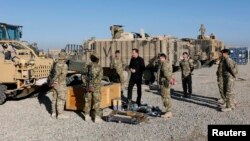LONDON —
Dozens of people are being detained by British forces at a military base in Afghanistan, Britain's defense secretary said Wednesday, following allegations the British army is running a secret detention facility at the base. Britain says it will return the detainees to Afghan authorities.
British Defense Secretary Philip Hammond, speaking on the BBC Wednesday, confirmed that Britain is holding up to 90 detainees at Camp Bastion, Britain's main military base in Afghanistan.
He said the detainees are suspected of murdering British troops or of being involved in the use of improvised explosive devices.
He said Britain would prefer to have handed the detainees over to the Afghan authorities.
"These numbers that we are currently holding are far higher than traditionally we would expect to have because the system effectively has been blocked up by the problems with transfer into the Afghan system," said Hammond.
Later Wednesday, the Ministry of Defense said it had found a "safe transfer route" to return the prisoners to Afghan authorities.
The move came after British lawyers acting for eight of the prisoners said their clients had been held for up to 14 months without charge.
Except in "exceptional circumstances," British forces are only allowed to hold suspects for 96 hours.
British lawyer Phil Shiner said Wednesday that Britain has been acting in an "entirely unconstitutional" way, and compared the extended detentions to the fate of terrorism suspects who have been indefinitely without trial at the U.S. detention facility in Guantanamo Bay, Cuba.
A spokesperson for the Afghan Ministry of Defense, General Zahir Azimi, said Wednesday that the British detentions were illegal and inhumane, and demanded that the suspects be handed over.
Defense expert Peter Felstead, editor of Jane's Defense Weekly, said Britain is stuck between a rock and a hard place because of fears that suspects could be at risk of abuse or torture if handed over to Afghan security forces.
"We have situations in the past where lawyers for Afghans who have been detained have sued the British army, because it was the British army who arrested them, after [which] they had been handed over to the Afghan authorities. So once that has happened, the UK had no choice but to stop handing over anybody," said Felstead.
He said the situation highlights a major failure by the NATO-led security mission in Afghanistan. Over the course of a decade, he said, international security forces have failed to create a situation in which its military operation works alongside the Afghan civilian effort to ensure due process is guaranteed.
With British troops soon leaving Afghanistan, however, he said the problem is unlikely to be resolved.
"The timing is such that there is not going to be any great will to put in place a long-term solution because we are going to be out of there next year anyway," said Felstead.
About two-fifths of British forces are to leave Afghanistan this year, with a complete coalition withdrawal expected to be finished by the end of 2014.
British Defense Secretary Philip Hammond, speaking on the BBC Wednesday, confirmed that Britain is holding up to 90 detainees at Camp Bastion, Britain's main military base in Afghanistan.
He said the detainees are suspected of murdering British troops or of being involved in the use of improvised explosive devices.
He said Britain would prefer to have handed the detainees over to the Afghan authorities.
"These numbers that we are currently holding are far higher than traditionally we would expect to have because the system effectively has been blocked up by the problems with transfer into the Afghan system," said Hammond.
Later Wednesday, the Ministry of Defense said it had found a "safe transfer route" to return the prisoners to Afghan authorities.
The move came after British lawyers acting for eight of the prisoners said their clients had been held for up to 14 months without charge.
Except in "exceptional circumstances," British forces are only allowed to hold suspects for 96 hours.
British lawyer Phil Shiner said Wednesday that Britain has been acting in an "entirely unconstitutional" way, and compared the extended detentions to the fate of terrorism suspects who have been indefinitely without trial at the U.S. detention facility in Guantanamo Bay, Cuba.
A spokesperson for the Afghan Ministry of Defense, General Zahir Azimi, said Wednesday that the British detentions were illegal and inhumane, and demanded that the suspects be handed over.
Defense expert Peter Felstead, editor of Jane's Defense Weekly, said Britain is stuck between a rock and a hard place because of fears that suspects could be at risk of abuse or torture if handed over to Afghan security forces.
"We have situations in the past where lawyers for Afghans who have been detained have sued the British army, because it was the British army who arrested them, after [which] they had been handed over to the Afghan authorities. So once that has happened, the UK had no choice but to stop handing over anybody," said Felstead.
He said the situation highlights a major failure by the NATO-led security mission in Afghanistan. Over the course of a decade, he said, international security forces have failed to create a situation in which its military operation works alongside the Afghan civilian effort to ensure due process is guaranteed.
With British troops soon leaving Afghanistan, however, he said the problem is unlikely to be resolved.
"The timing is such that there is not going to be any great will to put in place a long-term solution because we are going to be out of there next year anyway," said Felstead.
About two-fifths of British forces are to leave Afghanistan this year, with a complete coalition withdrawal expected to be finished by the end of 2014.




